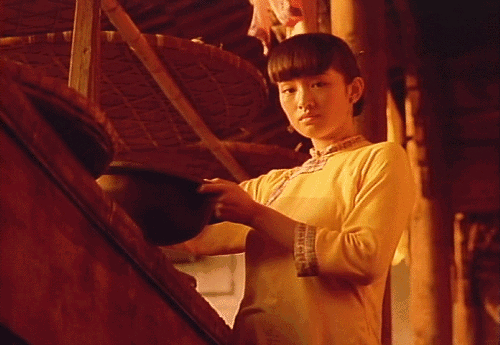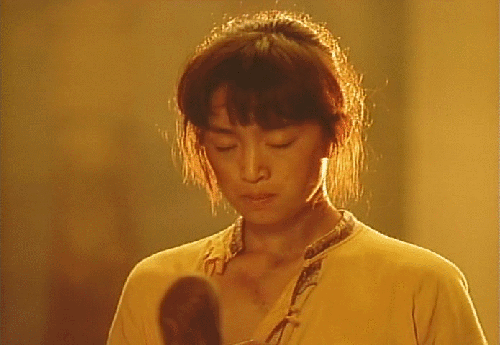“Listen carefully at night. You will hear your new auntie’s screams.”
Ju Dou (1990) dir. Zhang Yimou tells the story of the title character (the breathtakingly beautiful and brilliant Gong Li) bought by a wealthy, aging Yang Jin-shan to be his bride. Through a conversation between the old man’s adopted nephew Yang Tian-qing and a worker, it is discovered that Jin-shan tortured his two other wives to death and the same fate would probably await Ju Dou. Due to his own impotence, Ju Dou cannot bear the son Yang Jin-shan desperately wants and he takes out his sexual frustration by torturing Ju Dou tyrannically. Their marriage becomes violent and bitterly unhappy, but Ju Dou finds forced happiness through a secret relationship with Tian-qing.
It is gripping, poignant, and a visual masterpiece. Its use of lush colours has the earmarks of Zhang’s strikingly expressionistic visual artistry.
The below points are some concepts in Ju Dou that was striking.
THE MALE GAZE
In Laura’s Mulvey‘s writing of the ‘Male Gaze’, we view Ju Dou as an object of desire from a male perspective, although she is bold and controlling. Her introduction to Tianqing was through his point of view. Although we already know her to be tortured and bruised, the sun rays hit her face, and the golden yellow of the drapes reflects off her yellow clothes and she shines quite literally like the sun. In contradiction to the uncle and nephew choice of dull and dark clothing, Ju Dou is always dressed in red and yellow, the vibrancy of the clothes a sick irony of her dull life. She is always clothed in colours very consistent with the film’s way of representing passions – red and yellow.

An even more striking representation of Laura Mulvey’s theory of ‘The Gaze’ would be Tianqing’s second unpermitted viewing of Ju Dou taking her bath. This time, Ju Dou is aware that she is being looked at. She is reluctant to the idea but she knows it’s the only way to turn Tianqing against his uncle and save herself from a situation she can no longer bear. The idea of the woman turning to a man to save her. The male gaze here, also defined by Mulvey, presents the woman as an image, and the man as the bearer of the look. Even when the camera switches to the audience point of view, a baton in the middle of the screen could be interpreted as a phallus symbol. Thus, although there is a male gaze in the film, it is the female figure who, deliberately, reinforces it.

INDIFFERENCE
The film’s unabashed way with how it handled it’s almost indifferent, detached approach to the unfortunate fates that befell its characters is striking. Jinshan’s abuse of Ju Dou, for example, was shown more through the sounds of her cries muffled through walls. “When I buy an animal, I treat it as I wish. And you’re no better than an animal,” Dialogue is used more than scenes depicting direct violence and torture. The lack of visual evidence of such scenes did not hinder its audiences into feeling disgust for Jin-shan or pity for Ju Dou. The scene where Tianqing finally gave in to his sexual frustrations and made love to his aunt was understated and straight to the point. The camera focuses on the two of them with no close-ups and no emphasize of two characters’ sexuality.
OPPRESSION
The brazen storytelling reflects China’s unhindered patriarchal ruling and view of women at the time. Ju Dou depicts each of its male characters’ masculinity as dispersed, fragmented and flawed, a reflection of the changing social and political conditions of twentieth-century China.
When I was little growing up, I was always told stories of female babies being drowned or discarded when birthed simply due to their lack of a penis in China. This sexist, vile act is even named female infanticide, and the phenomenon has spanned a period of 2000 years in China. There had been a resurgence in the prevalence of female infanticide following the introduction of the one-child policy.
The notion scared me out of my wits, and I would cry, begging my parents not to throw me away as well. They laughed, of course, but they would sit me down and tell me it was not going to happen with me. It was partly because my paternal grandmother did not pay me as much attention as my brother (she ended up loving both of us) and everyone around me was surprised at my maternal grandmother because I was her favourite among a dozen grandkids that had more boys than girls. My Ah Ma constantly told me she did not believe in 重男轻女(to value males and belittle females). I’ve known plenty of girls whose parents treat them lesser than their male siblings simply because they were female. Even though this film tells the events of 1900s rural China, the blatant biasedness towards males was still very apparent throughout Asia well up to the early 2000s. This film hit home, and my heart broke completely for Ju Dou.
The film’s recurrent theme of oppression reads through all of the characters. Given the Chinese landscape of the patriarchal institution, the possibility of Jinshan pushed to manic cruelty in his despairing for an heir to carry on the Yang family name isn’t one to denounce. The importance of continuing and maintaining the pure name of the Yang family ran consistently throughout the film and gossip is highly feared for dread of disgrace. Even in front of his ancestors’ altar where it is absolute taboo to lie, Jin-shan denounces the disgrace of Ju Dou and Tianqing’s coupling. On Tianbai’s third birthday, Jinshan raises his head amongst his elders as proudly and as smugly as he could, unashamed of being able to uphold the highest honour – family honour.
Even though pushed to the limits and tortured his whole life, Tianqing remained submissive, dutiful and servile towards his tormentor, Jin-shan. Even when Ju Dou tries to convince him to run away with her and their son, and ultimately pushed to the idea of killing him, Jin-shan refused, saying “He is my uncle after all.” Tianqing insistence on adhering to the customs that have made his life wretched begs the question of how much cultural traditions should be tolerated.
Tianbai remained mute almost during the whole film but his silence spoke volumes. He may have supposedly inherited his real father’s docile, submissive nature, but he is nothing like Tianqing. Growing up in such a repressive Chinese society, he condemned his “brother Tianqing” for his relationship with his mother, wanting to first uphold the family honor before anything else, and was ready to chase and even murder anybody who would utter gossip about his widowed mother. In the end, the birth of the celebrated male is the cause of death for his biological father, mother, and Tian-shan.
These three male characters, standing for the three ages of man, are equally the victims of the claustrophobic social order of feudal China.
COLOURS
The only exception to the film’s dark slant is the lengths of cloth that draped almost every scene with its vivid colors and hues, cutting the narrative between the lines. Vibrant deep red for lust and passion or blood and death. Bright yellow for moments of realization and stark insight. Soothing blue for those of stillness and compromise.
All in all, Ju Dou is a film that is worthy of all of its controversy and appraise, and sets itself as a film of an expressionistic undertone of beauty, a melancholic beauty that lingers in the mind afterward.

It was interesting reading about the different concepts you identified about the film. Firstly, I really like ‘The Male Gaze’ you mentioned. We all know that in the past, women were supposed to be demure. However, the director took a different approach. Ju Dou was filled with anger and lust in her eyes. Next, I was surprised on how you managed to discuss about TianBai even though his presence in the film was not very prominent. I do agree on your take about how he possessed a strong side of his birth father. However, I think because of the lack of parental love and teaching since young, he was not taught the right way of thinking. Thus, he killed his birth father without second thoughts. Hence, this shows how ruthless he is. All in all, I like the way you structured your thoughts into this blog post. I felt comfortable reading it and have also gained much knowledge after reading.
Victoria
LikeLike
Glad that you saw the oppression that happens to every single character. It is easy to label the old man as the tyrant, but it is unfair to say that he wasn’t oppressed at all. Also, Dawn has the eye of an eagle, noticing the phallus symbol in a fast paced introduction! I also totally agree that Tianbai’s character, even though silent most of the time, spoke volume. Even though he did not actually articulate his thoughts throughout the film, it was easy to understand where his hate stems from, through the on scene chemistry between young him and the barrel ridden old man. The young and ignorant can be easily mislead into bad things, depicting the consequences of a narrow minded society in rural China. Great insight!
LikeLike
An interesting read, as always. I particularly enjoyed how you brought up the juxtaposition of vibrancy of Ju Dou’s clothes and the sick irony of her dull life, a sick irony of light and dark.
Your point on the treatment of females in China was very enlightening, and I thought that it was brilliant how you drew on your life experience to shed light on a very twisted aspect of Chinese culture. Brought up in a traditional Chinese family, I too witnessed such gender injustice on many occasions. The parallels to real-life made me as a reader more drawn to your writing.
Of course, Zhang Yimou’s signature use of bright and vibrant colours was prevalent in this movie, from the lighting to the dye, and the clothes. As an avid moviegoer, it is always exciting to see an auteur’s individualistic style and signature stamped on his/her film.
Spectacular review, hope to see more of your work in the coming weeks!
LikeLike
This was another Zhang YiMou film that I really enjoyed and your review has made it better. It’s always nice to read another person’s view and to see things that I’ve myself missed. In my opinion, even though it’s shown in the film that Ju Dou and Tian Qing really loved Tian Bai. He clearly does not feel the same way about his biological father. In fact, I feel like Tian Bai might actually have a some mental problem. Maybe because as a baby he’s present during his parents tryst or that while his parents are away as a toddler, and he’s left with Jin Shan and hence is poisoned him (after all, young children are impressionable). I also found it pretty sick that the only time Tian Bai laughs is when he sees Jin Shan drowning.
LikeLike
You did a great job analyzing and reviewing the film. It’s a very informative article and the part where you include your own experience really turned this post into a lively one. Even though like you mentioned, the film really has a strong male gaze in it, but the fact that Ju Dou rebels and selfishly pursue her own desire while Tian Qing remains submissive and dutifully follow the Chinese customs, turns the tide around.
This film portrays a darker perspective on the Chinese patriarchy and is very different from Zhang Yi Mou’s subsequent films. With all its controversy and unorthodox vulgar scenes, it’s definitely not meant for entertainment. Yet, it is still a film worth to watch.
LikeLike